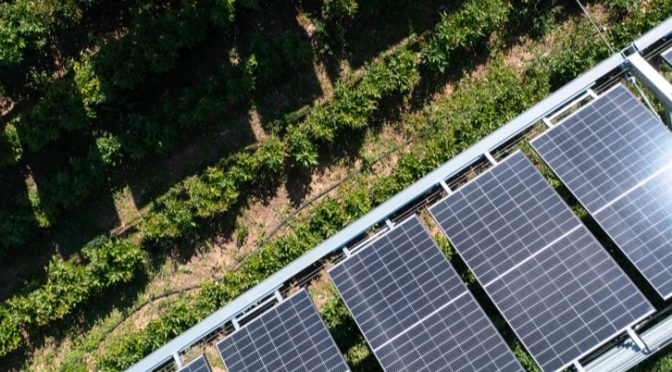- The ‘challenge’ launched through its PERSEO international start-up programme has received 110 proposals from 32 countries.
- The company will provide technical and financial support to develop the solutions, will consider expanding the scale of the projects through commercial agreements and will consider investing in the winning companies
Iberdrola is making progress in its commitment to preserving biodiversity while rolling out its ambitious investment plan in renewable projects. Through its PERSEO international start-up programme, it has selected four international projects to identify innovative solutions that promote the coexistence of solar photovoltaic generation plants with activities related to agriculture, livestock farming and horticulture, in order to improve the efficiency and competitiveness of the facilities, the use of the land and to protect biodiversity.
The solutions are aimed at creating synergies on land used primarily for farming that is also suitable for solar photovoltaic installations, to find the best ways for these activities to co-exist and boost local economies. The projects presented support the energy transition and the fight against climate change, as well as being located in areas facing demographic challenges.
Iberdrola will provide the winning companies with technical and financial support to test their solutions, giving them access to the resources needed to develop them (equipment, teams, infrastructure, and co-working areas) in a real-world environment. If a pilot project is successful, Iberdrola may also offer the participant the opportunity to scale-up the solution with commercial agreements or direct investment in the company through PERSEO.
Photovoltaics compatible with irrigated crops, viticulture, olive and fruit trees and animal welfare
In response to this challenge, the company received 110 proposals from 32 countries. Iberdrola has selected four winning companies, and will design projects in various locations:
- Irrigated crops: the Spanish company EcoEnergías del Guadiana has presented a pilot project to combine tomato cultivation under fixed or retractable structures that support solar panels, making possible to mitigate plant stress during heat waves, save water and improve harvest yields.
- Viticulture: the Winesolar project is a collaboration between three Spanish companies: Techedge (advance technological solutions), PVH (PV tracker and structure manufacturer) and Gonzalez Byass (Wine and Spirits with 14 wineries in Spain, Chile, Mexico and 3 distillery).
The challenge of mitigating and adapting to the climate change effects in viticulture is a major undertaking. The Winesolar solution will develop a photovoltaic system with an intelligent tracker adapted to generate shadow and protect vineyards. Additionally, an artificial intelligent algorithm will control those trackers to adapt them to the physiological needs of the vineyards, and in parallel optimize PV production.Data gathered by the sensors, rolled out in the vineyards to measure humidity, temperature, etc will also feed the algorithm. In short, Winesolar aims to help make vineyards more resilient to climate change and to be neutral or negative in terms of CO2 impact. - For Fruit trees: Dynamic agrivoltaic solution. French startup Ombrea has developed a climate control and regulation system powered by artificial intelligence to protect crops against climate change. The remote solution, based on solar panels, spreads out and retracts in order to modulates light and shadow according to data collected on-site via sensors. The aim is to protect plants from extreme heat, drought, hail and frost.
- Bovine care: French company itk is developing science-based solutions to support the agricultural and agrifood sectors in adapting to climate change and decarbonizing agriculture while ensuring the performance and resilience of farms. Its FarmLife cow behavior monitoring and analysis platform aims to enhance time management and improve performance by providing decision-making data on 4 pillars of productivity: reproduction, nutrition, comfort and health.
Competitive and sustainable energy and environmental balance
Iberdrola has fully integrated the biological diversity of ecosystems into its strategy, demonstrating that competitive, clean and sustainable energy supply can effectively coexist with environmental balance.
The company plans to achieve “zero net biodiversity loss” by 2030, by committing to a net positive impact for its new infrastructure developments.
Iberdrola has carried out more than 1,450 actions to protect biodiversity over the last three years that combine installing renewable projects with conserving the biological diversity of ecosystems, caring for flora, fauna and natural heritage. The most recent project involved installing beehives in photovoltaic projects to preserve biodiversity and promote the circular economy.
Bovine livestock is present in many Iberdrola PV plants. Iberdrola has worked with landowners to develop sustainable cattle management plans, which helps to avoid over-grazing and ensure the protection and development of plant species. Cattle management on-site also allows for vegetation height control, which reduces fire risk as well as providing nutrients and seeds for the soil, increasing natural biodiversity.
In Spain, Iberdrola and ASAJA have signed a strategic alliance to promote emission-free sustainable agriculture and livestock farming. A work plan has been designed with two objectives: to promote actions aimed at improving energy efficiency and delivering initiatives to preserve biodiversity and care for the rural environment.
PERSEO: more than 10 years of innovation
Iberdrola’s PERSEO international start-up programme aims to facilitate Iberdrola’s access to the technologies of the future and to promote the creation and development of a global and dynamic ecosystem comprising technology companies and entrepreneurs in the electricity sector. To achive this, it has 85 million to invest in start-ups and, through its Perseo Venture Builder unit, another 40 million to launch innovative industrial companies working in new areas related to electrification and in sectors that are difficult to decarbonise.
Since its creation in 2008, PERSEO has invested 70 million euros in start-ups that are developing innovative technologies and business models, focusing on those that improve the sustainability of the energy sector through greater electrification and decarbonisation of the economy.
The programme has focused its actions on analysing business opportunities and technological collaboration with start-ups and emerging companies around the world, analysing 300 companies each year and creating an ecosystem of almost 3,000 dynamic companies. This investment instrument currently has a portfolio of eight companies.

